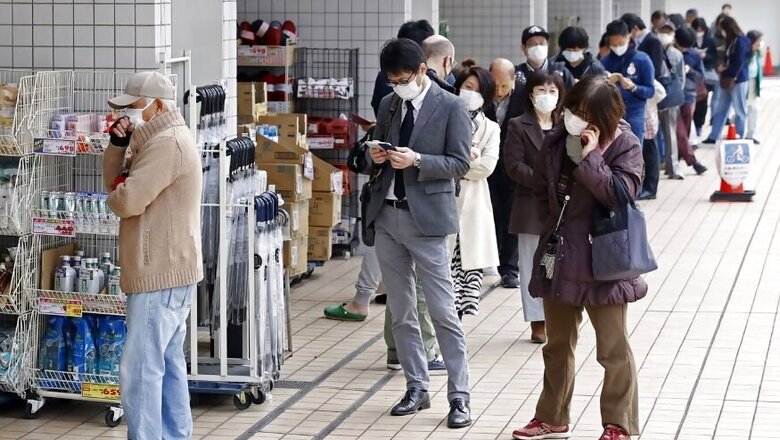
views
On March 28, Prime Minister Shinzo Abe told reporters that his government had begun the formal process for designating anti-influenza drug Avigan as Japan’s standard treatment for Covid-19.
A critical step in that process involves clinical trials, one of which will conclude by the end of June, according to a report by Wired. And while there is not yet any detailed data supporting Avigan’s effectiveness in treating Covid-19, there are some reasons for optimism. One of them came up on March 17, when Zhang Xinmin, an official at China’s ministry of science and technology, said that Favipiravir, the generic version of Avigan, had proved to be effective in treating Covid-19 patients at hospitals in Wuhan and Shenzhen.
Zhang told Wired that it was "very safe and clearly effective" for treating Covid-19 patients. And while the data and methodology behind Zhang's claims have not been made public, he did announce some of the conclusions doctors had drawn from them. At a hospital in Shenzhen, Zhang claimed Covid-19 patients treated with Favipiravir tested negative for the virus after a median of four days, rather than the 11 days it took for members of the study’s control group to test negative. In another study carried out in Wuhan, patients taking the drug allegedly recovered from fever nearly two days earlier than those who did not take the medication.
Such results, preliminary and unconfirmed as they are, would seem to conform with the way Favipiravir works. Unlike most other influenza treatments, which inhibit the spread of the virus across cells by blocking the enzyme neuraminidase, Favipiravir works by inhibiting the replication of viral genes within infected cells, thereby mitigating the virus’s ability to spread from one cell to another.
What this means, in practical terms, is that patients who take the drug while their viral load is low or moderate may prevent it from making them any sicker.
Meanwhile, according to a report by Bloomberg, Gilead Sciences Inc. said it is donating 1.5 million doses of its experimental anti-coronavirus drug remdesivir, which could treat 1,40,000 patients.
The drug will be offered for "compassionate use" and will treat patients with severe symptoms, Chairman and Chief Executive Officer Daniel O’Day said in an letter accessed by Bloomberg.
The company is also boosting its supply of remdesivir to more than 500 treatment courses by October, and to more than 1 million by the end the year. Production time has also been accelerated to six months from one year, he said.
"While we are working with the utmost sense of urgency on the immediate needs before us, we are also looking forward," he said. "Over the next weeks and months, we will be able to further increase our supplies of remdesivir as raw materials with long lead times become available for manufacture."
The drugmaker said last week it’s switching to "expanded access" from a "compassionate use" program under which remdesivir was given to more than 1,000 Covid-19 patients. The move will accelerate its emergency use for multiple severely ill patients.
A World Health Organization panel said in January that remdesivir was considered to be the most promising therapeutic candidate based on its broad antiviral spectrum, and existing data based on human and animal studies. The medication was developed initially for Ebola and studied in patients in Eastern Congo.
Multiple clinical trials are investigating the drug’s effects in Covid-19 patients in China and elsewhere.



















Comments
0 comment